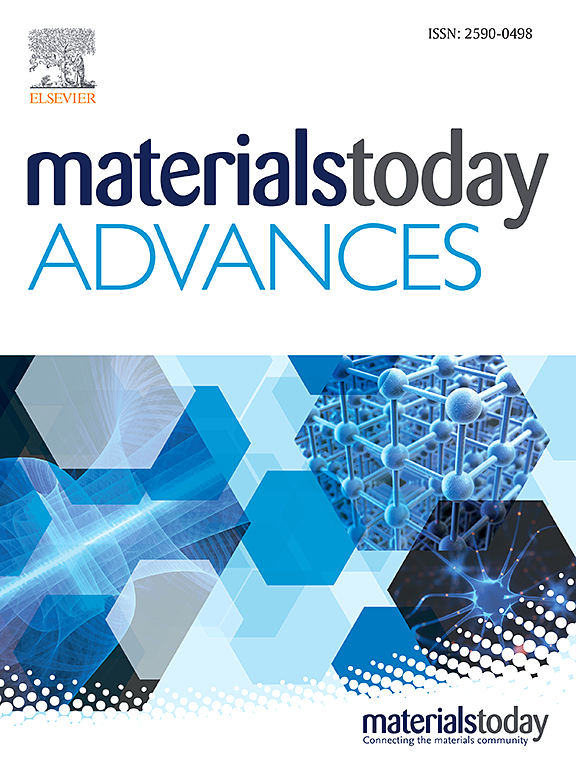不同尺寸银纳米颗粒负载的缺锌 Cu0.1Zn0.9O 光催化剂具有制氢和抗菌双重功能
IF 8
2区 材料科学
Q1 MATERIALS SCIENCE, MULTIDISCIPLINARY
引用次数: 0
摘要
本研究旨在寻找一种环保的双重材料,应用于能源和抗菌工业,并确定其活性位点。研究采用简单的水热法合成了在 ZnO 框架中含有 10% Cu 离子的 CuZnO 纳米粒子(NPs),并负载了 10、20、30 或 40 nm 大小的 Ag NPs,得到 Ag@CuZnO 粒子。从光电流密度随时间增加的情况来看,Ag NPs 具有光电子收集能力。与 ZnO 和 CuZnO 不同,Ag@CuZnO 催化剂能很好地分裂水产生氢气。尤其是负载了 30 nm Ag NPs 的催化剂,制氢效率最高,达到 424.54 μmolg。这证明了在水分裂过程中产生氢气的活性位点是接枝在 CuZnO 颗粒导带上的 Ag NP 表面。相反,所有 ZnO、CuZnO 和 Ag@CuZnO 样品都具有抗菌性能。添加了 Ag NP 的样品的抗菌性能略有提高,但并不显著,这表明表现出抗菌活性的活性位点是 CuZnO 的价带空穴。最后,本研究揭示了光催化活性的优势并不总是有效的抗菌活性,因为表现光催化和抗菌特性的活性位点可能并不相同。本文章由计算机程序翻译,如有差异,请以英文原文为准。
Dual functionality for hydrogen production and antibacterial activity in Zn-deficient Cu0.1Zn0.9O photocatalyst loaded with Ag nanoparticles of various sizes
This study aims to find an eco-friendly dual material to apply toward energy and antibacterial industry, and to identify their active sites. CuZnO nanoparticles (NPs) containing 10 % Cu ions into ZnO framework are synthesized using a facile hydrothermal method, and 10, 20, 30, or 40 nm-sized Ag NPs are loaded to obtain Ag@CuZnO particles. From the time-dependent increase in photocurrent density, it is confirmed that the Ag NPs has a photoelectron harvesting ability. Unlike ZnO and CuZnO, the Ag@CuZnO catalyst well splits water to generate hydrogen. Particularly, the catalyst loaded with 30 nm Ag NPs achieves the highest hydrogen production efficiency of 424.54 μmolg. This proves that the active sites generating hydrogen during water splitting are the Ag NP surfaces grafted onto the conduction band of the CuZnO particles. Contrastingly, antibacterial performances against are expressed in all samples of ZnO, CuZnO, and Ag@CuZnO. The antibacterial performance for the Ag NP-loaded sample slightly increases but it is not significant, indicating that the active site exhibiting the antibacterial activity is the hole of the valence band of CuZnO. In the end, this study revealed that the advantageous photocatalytic activity does not always express effective antibacterial activity because the active sites exhibiting photocatalytic and antibacterial properties may not be the same.
求助全文
通过发布文献求助,成功后即可免费获取论文全文。
去求助
来源期刊

Materials Today Advances
MATERIALS SCIENCE, MULTIDISCIPLINARY-
CiteScore
14.30
自引率
2.00%
发文量
116
审稿时长
32 days
期刊介绍:
Materials Today Advances is a multi-disciplinary, open access journal that aims to connect different communities within materials science. It covers all aspects of materials science and related disciplines, including fundamental and applied research. The focus is on studies with broad impact that can cross traditional subject boundaries. The journal welcomes the submissions of articles at the forefront of materials science, advancing the field. It is part of the Materials Today family and offers authors rigorous peer review, rapid decisions, and high visibility.
 求助内容:
求助内容: 应助结果提醒方式:
应助结果提醒方式:


